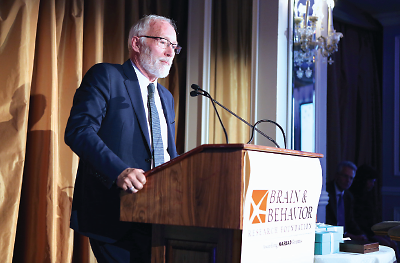At the 27th Annual New York Mental Health Research Symposium, held October 23 in Manhattan’s Kaufmann Music Center and sponsored by the Brain and Behavior Research Foundation (formerly NARSAD), keynote speaker Keith O’Neil—a former NFL player who founded the 4th and Forever Foundation to help raise awareness of mental illness—spoke movingly about his difficulties growing up.
While on the outside he seemed a typical student who was well liked and driven both in the classroom and football field, he battled continual mood swings, insomnia, and even suicidal thoughts, he explained to the audience. This internal struggle continued for years, and it wasn’t until after he retired that O’Neil was diagnosed with bipolar disorder.
As encapsulated by O’Neil’s story, a recurring theme of this year’s symposium was the need to appreciate that mental illness develops and changes across a person’s entire life course.
“Mental disorders like schizophrenia are not silent in the early years,” said Robert Freedman, M.D., chair of the psychiatry department at the University of Colorado School of Medicine in Denver and editor in chief of the American Journal of Psychiatry. “And psychiatrists need to rethink their approaches to diagnosis and treatment.”
Freedman, one of the recipients of this year’s Lieber Prize for Outstanding Achievement in Schizophrenia Research, discussed this shift in views during a lecture about rethinking schizophrenia’s origins. He described the association between a gene called CHRNA7, which makes a receptor targeted by acetylcholine, and psychiatric disorders including schizophrenia and autism. This discovery has led to some clinical studies showing that supplementing pregnant women with the nutrient choline can lead to improved attention and social skills in their infants.
If additional studies bear this out, choline might join folate as a preventative supplement to reduce the risk of neurodevelopmental problems during pregnancy. Yet there are other areas of mental illness—such as psychosis risk—where prevention or early intervention of mental illness is not given a high priority, Patrick McGorry, M.D., Ph.D., explained during a lecture.
McGorry, a professor of youth mental health at the University of Melbourne, was also awarded the Lieber Prize for Outstanding Achievement in Schizophrenia Research. McGorry is credited with shifting the therapeutic paradigm for schizophrenia to early detection and intervention in young people. His research has also helped to identify ways to help reduce the likelihood that those at high risk for psychosis develop the disorder.
“Bob Freedman and Patrick McGorry are exemplary researchers and terrific people who truly embody the caliber of scientist that the Liebers wanted to recognize and reward,” said former APA President Herb Pardes, who is the president of the BBRF’s Scientific Council and executive vice chair of New York-Presbyterian Hospital’s Board of Trustees.
“All of the award winners are outstanding,” he continued (see sidebar). “And they show the international scope of high-quality mental health research.”
During the symposium, Barnaby Nelson, Ph.D., an associate professor and director of the Ultra High Risk for Psychosis research program at Orygen in Melbourne, Australia, and a recipient of the Sidney R. Baer Jr. Prize for Outstanding Achievement in Innovative and Promising Schizophrenia Research, expressed optimism that research into prodromal disease, especially psychosis, has increased significantly in the past few years. However, being able to predict which at-risk individuals will eventually develop psychosis remains challenging.
Nelson went on to discuss his own research at employing “self-disturbance” as a marker for psychosis. Basic self-disturbance involves a sensed loss of ownership over one’s body or experiences, and Nelson has found this to be a significant predictor of a psychotic transition; he is currently exploring the neurological mechanisms behind this.
Fellow Sidney R. Baer Jr. Prize recipient Camille Hoffman, M.D., an assistant professor of maternal-fetal medicine at the University of Colorado School of Medicine in Denver, has gone back even earlier in the development process to explore the fetal origins of psychosis. The prenatal period is the most active time in the development of the human brain, but studying the brain of a developing fetus can be challenging.
Hoffman has overcome some of these issues by making use of more available resources; as part of a team effort between Colorado’s psychiatry and obstetrics departments, she is taking hair and fingernail samples from pregnant women and later their infants to assess the role of stress on the developing brain. These regions house reservoirs of cortisol and other agents that could be used to measure hormone levels at specific times.
Such collaboration represents what the Brain and Behavior Research Foundation strives for in the many research grants it supports, especially the Young Investigator Awards handed out every year.
Robert Hirschfeld, M.D., a professor of psychiatry at Weill Cornell Medical Center and moderator of the symposium, explained, “We want to find young, exceptional researchers who could choose to work in any medical area, and we want to get them working in mental health.”
The two recent Young Investigator Award recipients chosen to speak at this year’s event—pharmacogenomics researcher Jianping Zhang, M.D., Ph.D., of the Feinstein Institute for Medical Research and engineer Markita Landry, Ph.D., of the University of California, Berkeley—are prime examples of this goal.
Landry in particular highlights the foundation’s mission to connect the brain and observed behaviors. Her work involves developing optical sensors using nanotechnology to visualize how brain cells interact with each other. With her Young Investigator grant, she aims to use these nanosensors in animal models to study the uptake and release of neurotransmitters.
This work could one day lead to diagnostic tools that could identify minute changes in brain cells, thus identifying psychiatric and neurological problems at their earliest stages. ■
More information about the nine recipients of the Brain and Behavior Research Foundation’s Outstanding Achievement Prizes can be accessed
here. More information about the Brain and Behavior Research Foundation is available
here.



